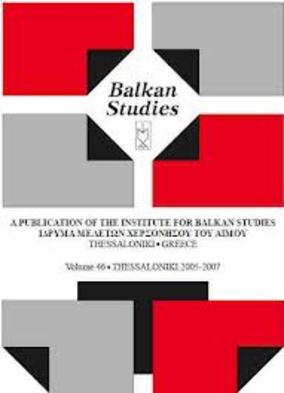Historical reality and legend in Alexander Pushkin’s short story kirdjali : An episode from the Greek insurrection of 1821 in the Romanian principalities
Part of : Balkan studies : biannual publication of the Institute for Balkan Studies ; Vol.33, No.1, 1992, pages 57-98
Issue:
Pages:
57-98
Section Title:
Articles
Author:
Abstract:
The purpose of this study is to analyze, discuss, and delineate the historicalfacts from the legendary and fictional elements in Pushkin’s short’ storyKirdjali. From the time of its publication in 1834. the story produced a spiriteddebate among scholars, literary critics, and historians, which continued downto the 20th century. The controversy centered on the question whether thestory is an historical or a fictional account, and whether the prototype ofPushkin’s hero, Kirdjali, was a living historical person or merely a legendarycharacter of a folk brigand.The majority of the Pushkinian scholars agree that Kirdjali is a shortnarrative dealing with an episode from the Greek or Hetairist insurrectionin the Romanian Principalities in 1821. But they disagree on the questionwhether Kirdjali was an historical person or simply a fictional character.One group of critics considers Pushkin’s hero an inventive, fictitious, anecdotal,and romantic character. The second group argues that Kirdjali was aauthentic historical person; that he fought in the ranks of Ypsilanti’s armyin the Romanian Principalities in the summer of 1821; and that the accountof the story is based on authentic historical sources.Both groups of scholars and critics raised several important points intheir works in defense of their arguments. This study attempts to separatethose elements which constitute the anecdotal part of the story from thosefacts which are based on historical reality.The author concludes that Pushkin’s story is a combination of fictionaland historical narrative. It contains reliable aspects from the Ypsilanti’smovement in the Principalities. Some of Kirdjali’s actions are often fictionalizedand his fame as a brigand is achieved through the aura of a folk herobased on popular tales and legends which circulated in Bessarabia and Moldaviaat the beginning of the 19th century. At the same time, Pushkin ascribesto Kirdjali the qualities of a rebel who struggles against social injustice. Heis a daring and humble individual; an avenger on the Turkish masters, punishingthe powerful, condemning the predatory for suppressing and exploitingthe poor and downtrodden, and glorifying freedom.
Subject:
Subject (LC):
Keywords:
Επεισόδιο από την ελληνική εξέργεση του 1821 στη Ρουμανία




